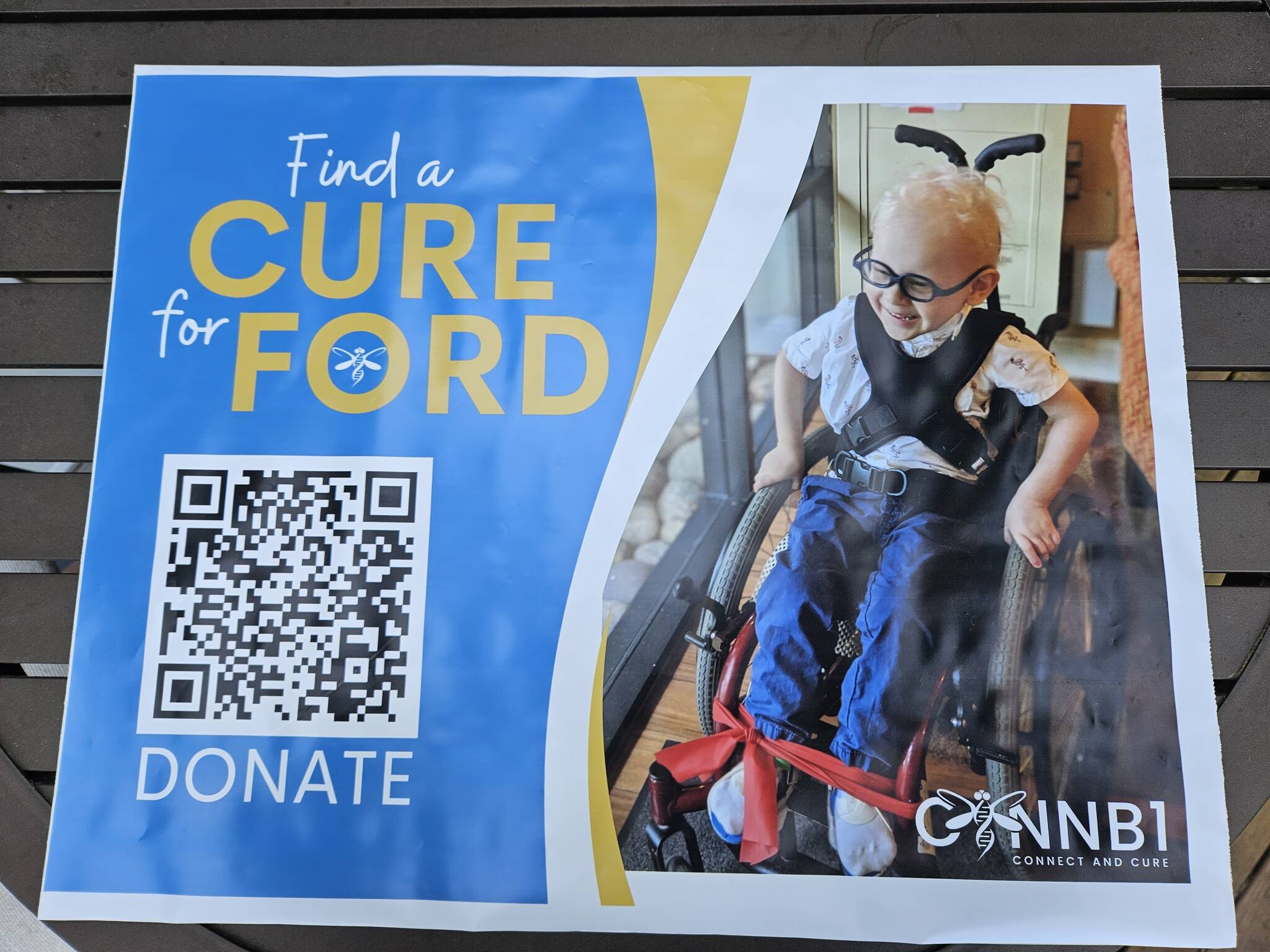As you’re driving around Mercer Island this month, you may see some signs along the roads that say “CURE FORD” in big yellow letters next to a picture of a grinning blond-haired kid in a wheelchair. In smaller print, you’ll see it says “Find a CURE for FORD.”
That’s my grandson, Ford Parks, who will be 7 years old on June 30. He has changed my life and that of my entire family.
Ford was born with an extremely rare genetic disorder called CTNNB1 Syndrome. He is one of about 400 kids in the world diagnosed with this condition, although more cases are being found as genetic testing becomes more widespread.
It’s just a small, random tweak in his genes, but with big impacts. Ford is largely non-verbal, has significant mobility issues, painful movement disorder, and seizures. He is fed by a tube in his stomach and will be in a wheelchair for the foreseeable future. He has been in many therapies over his short life, and they are making a difference. He’s learning some words and how to put them together in short sentences. His fine- and gross-motor skills are improving. And if you’ve seen him around the Island, you know he is joy personified as he screams along in his “wheelie” laughing all the way as we try to keep up with him!
But here’s the bigger story: CTNNB1 is just one of about 10,000 known rare diseases in the world with millions of people affected. But because each of those conditions is by definition rare – fewer than 200,000 diagnoses – very few have broad public recognition.
As a result, parents and families affected by rare diseases must work on their own to raise awareness and funding for research. Here’s what his mother, Effie Parks, who came up with the idea for the yard signs, posted on Facebook recently:
“Did you know that there is NO wizard behind the curtain, no government, no medical/research/pharmaceutical companies coming in to help our children who have rare diseases? No doctors we see know anything about the disease until WE educate them.
“We learn to speak a language that has nothing to do with our former lives. We are regular people who used to balayage your hair, serve your breakfast and clean your house.
“Those living with ultra-rare diseases basically don’t exist unless regular ol’ families like ours literally hunt down the special brains to help us. We raise money and fund research to understand our disease and help to develop treatments to better their lives in the most meaningful way.
“Nobody is asking you at the grocery store if you want to donate a dollar to Ford Parks and the disease that he suffers from….We can’t do this alone. Will you help us?”
Effie used to run her own successful hair salon, but after Ford was born and diagnosed – after 16 months of agonizing uncertainty – she was no longer able to work due to his constant illnesses, multiple weekly appointments, and no reliable childcare for a severely disabled child. She soon began a remarkable effort to connect families of kids with the same disorder and other rare diseases. She started a podcast called “Once Upon a Gene” that has won national awards and has followers worldwide. She is in demand as a speaker at conferences and works with Global Genes and other organizations to network with parents and researchers. She’s a “rare mama,” as these mothers often call themselves. Fathers are involved too, as “DADvocates.”
Effie (and Ford’s DADvocate, Casey) have formed close working relationships with other parents of rare kiddos, including Jill and Doug Hawkins of Mercer Island, who have two kids with a rare disease, Charlotte and Cooper. The families have held events on Rare Disease Day (February 28).
Awareness is growing. The Mercer Island City Council gave February 28 a permanent annual designation as Rare Disease Day by official resolution. The City Parks Department revamped plans for renovating Mercerdale Park when a group of parents brought the need for accessibility to their attention – and are now including that consideration in future city park upgrades. The Mercer Island School District has been a leader in programs for disabled kids. Ford is in a terrific Individual Education Program at Northwood School, which he loves. Groups like the Friendship Circle (www.friendshipcirclewa.org ) for many years have brought young high-schoolers and disabled kids together, which benefits both.
When I was in school in the 1950s and 1960s, kids with disabilities were too often separated, hidden away, or institutionalized. Many were neglected and abused. We’ve come a long way, but more remains to be done. Mainstreaming is challenging and can be costly, but it’s the right thing to do.
Until I had a disabled child in my family, I admit to being aware of but not involved with the problem or the need for wider recognition and more funding for treatments and eventual cures.
Ford has changed that.
It’s why you may see me out there putting up more signs. If you want one for your front yard, let Effie know at www.effieparks.com. Ford would love that.
FULL DISCLOSURE: On the signs you’ll see a QR code that links to www.curectnnb1.org, a nonprofit organization. My wife, Mariana Parks, and my daughter-in-law, Effie Parks, are on the board of this group, CTNNB1 Connect and Cure. It’s a 501c3, so all donations are tax-deductible. And July 25th is CTNNB1 Awareness Day. Help Cure Ford.
John Hamer is a former editorial writer and columnist for The Seattle Times who has lived on Mercer Island since 1999. He and his wife have four grandchildren. Email jhamer46@gmail.com.


